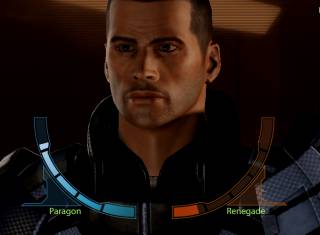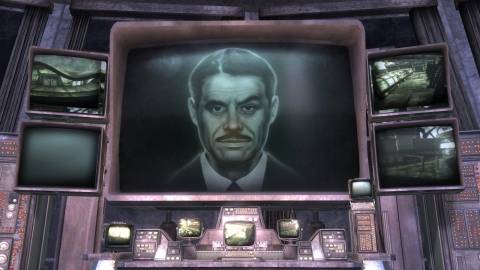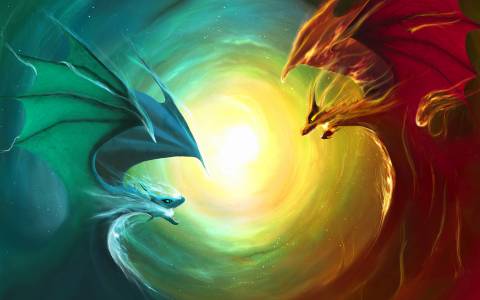Choices, Story, and Where It All Goes Wrong- Part 2
By gamer_152 11 Comments
This blog is a continuation of Choices, Story, and Where It All Goes Wrong- Part 1.
Alternate Choice Systems

Two simple improvements to existing choice systems would be to give the player more rewards for taking a neutral stance in moral choices or hiding the results of choices so that players feel less compelled to always choose certain options, but there are other options too. I suspect that one of the reasons that moral choice systems became so popular in the first place is that their basic mechanics offer a persistent, overarching assessment of the player’s actions of the game, judged by one of the most obvious and inherently impacting measures we can use; morality. It is perfectly possible, however, to keep the bare mechanics of the moral choice system, but base it around a concept with fewer pitfalls than morality.
This is a strategy which Mass Effect used, measuring players on “paragon” and “renegade” scores instead of “good” and “evil”, essentially using a system similar to Dungeons & Dragons’ order vs. chaos spectrum. Mass Effect was able to present questions like “Is it right to allow someone to try and kill the same people who tried to kill them?” without imposing a concrete right or wrong answer on the player. In this kind of situation not everyone is going to agree on what the “right” thing to do is, but almost everyone is going to be able to agree on which decision is lawful and which is chaotic.
In fact it’s not hard to imagine games trying to give players feedback on other perceivable aspects of their actions using these kinds of systems. Political stances, social stances, and everything right down to the way you fight in the game all seem like candidates for this kind of overhaul, there’s not even a reason why games couldn’t even track more than one of these kinds of judgements at a time. Whether games are looking to deal with morality or other issues in choice systems though, there is another mechanic which has been round for a long while which can often help.
Faction Systems

Faction systems are something that have been around for a while, but certainly present a great alternative to simple morality systems if done right. By having a group symbolise a collection of views, instead of distilling everything down to two simple opposing viewpoints, the game allows for more complex opinions to be presented without it feeling overwhelming and often allows you to see what happens when those views are put into practise before you make a decision.
This system certainly worked well for Fallout: New Vegas which used a faction system instead of the good/bad meter that Fallout 3 used to judge all story choices in the game by. These kinds of systems needn’t revolve around entire groups of people though; Catherine used a system where two individual people represented the concepts the player was tasked with choosing between. In the game the player has to pick one of two girlfriends as their partner, with one potential girlfriend representing adulthood and responsibility, and the other representing youth and a relaxed attitude to life.
Real Story Branches
Systems like those of Mass Effect and Fallout: New Vegas aren’t dealing with black-and-white morality though, what if the designer really is dead-set on dealing with good and bad as the fundamental concepts of their game? I think one thing that could be improved would be for the consequences of your moral choices in the game to have more of an impact. As it is you may end up with a different ending, different dialogue, perhaps some vendors will raise or lower their prices, but consequences rarely stretch too far beyond this. The story usually plays out in basically the same way, with the same character relationships and plot events. In the real-world and other stories things don’t work like that, based on whether they’re good or evil people will make different friends and enemies, have different options open to them in the world, receive different rewards and have different restrictions in tackling scenarios.
Unfortunately, the lack of vast disparity between the good and evil paths in many games is at least partly to do with the fact that creating more content for each path and balancing the good and evil sides equally, costs a large amount of money and consumes a large amount of time. This is time and money which the developers may not have or may wish to use working on more important parts of their game. Games becoming more and more desperate to show players all of their content in one run is also becoming a bigger problem.
There are certainly shortcuts designers can take to ensure differing paths for different moral decisions, such as reusing content in different ways depending on your moral alignment, but not every player responds to this well, and overall it’s hard to really justify the idea of significantly increasing budgets and lengthening dev cycles for better moral choice systems alone. Hopefully this is just something that will improve as the industry evolves.
The Core Rules

This kind of change needn't be about content though, if a developer was particularly committed to the idea of moral choices they could implement them at a fairly low level in the game design. For example, being evil could be harder than being good, but provide greater rewards. Perhaps being good could help you make more allies in the game and make vendors lower their prices, but being evil meant you could “break” certain rules of the game. It must be remembered though that all the improvements I’ve mentioned in this blog still provide a gameplay incentive to pick a certain choice and so still create potentially conflicting decisions. The changes in this last paragraph might be appropriate for games light on story, wishing to present gameplay which acts as a metaphor for moral choices, but overall implementing any of these systems which give players gameplay rewards for choices in the story is going to cause serious problems that designers have to acknowledge.
Duder, It’s Over
To some extent I do enjoy these moral choice systems, designers are certainly right that I enjoy the persistent positive feedback for my actions in the game, and maybe a lot of you enjoy moral choice systems in their entirety, but I've seen a lot of people lamenting the popularity they've achieved in games and I feel the same way. Either way I don't think choice systems are going away any time soon, not as the industry delves further and further into the habit of rehashing the same mechanics over and over, but I'd like to think we could at least see a change in the way choice-based systems are implemented, and that some time in the relatively near future we could see the death of the good-evil meter. Thank you for reading.
-Gamer_152
11 Comments